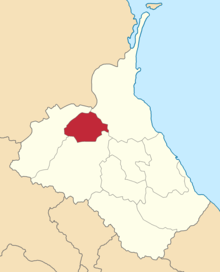Avarsky okrug
Аварскій округъ | |
|---|---|
 Location in the Dagestan Oblast | |
| Country | Russian Empire |
| Viceroyalty | Caucasus |
| Oblast | Dagestan |
| Established | 1864 |
| Abolished | 1928 |
| Capital | Khunzakh |
| Area | |
| • Total | 1,306.80 km2 (504.56 sq mi) |
| Population (1916) | |
| • Total | 35,749 |
| • Density | 27/km2 (71/sq mi) |
| • Rural | 100.00% |
The Avarsky okrug[a] was a district (okrug) of the Dagestan Oblast of the Caucasus Viceroyalty of the Russian Empire. The area of the Avarsky okrug is included in contemporary Dagestan of the Russian Federation. The district's administrative centre was Khunzakh.[1][page needed]
The subcounties (uchastoks) of the Avarsky okrug were as follows:[2]
| Name | 1912 population | Area |
|---|---|---|
| Khunzakhskiy uchastok (Хунзахскій участокъ) | 19,026 | 524.32 square versts (596.71 km2; 230.39 sq mi) |
| Koysubulinskiy uchastok (Койсубулинскій участокъ) | 13,687 | 623.95 square versts (710.09 km2; 274.17 sq mi) |
According to the Russian Empire Census, the Avarsky okrug had a population of 37,639 on 28 January [O.S. 15 January] 1897, including 18,890 men and 18,749 women. The majority of the population indicated Avar to be their mother tongue.[3]
| Language | Native speakers | % |
|---|---|---|
| Avar-Andean | 36,063 | 95.81 |
| Arabic | 912 | 2.42 |
| Russian | 428 | 1.14 |
| Ukrainian | 83 | 0.22 |
| Polish | 26 | 0.07 |
| Dargin | 18 | 0.05 |
| Kazi-Kumukh | 13 | 0.03 |
| Jewish | 12 | 0.03 |
| Georgian | 11 | 0.03 |
| German | 7 | 0.02 |
| Armenian | 6 | 0.02 |
| Kumyk | 5 | 0.01 |
| Kyurin | 4 | 0.01 |
| Tatar[b] | 4 | 0.01 |
| Chechen | 1 | 0.00 |
| Persian | 1 | 0.00 |
| Other | 45 | 0.12 |
| TOTAL | 37,639 | 100.00 |
According to the 1917 publication of Kavkazskiy kalendar, the Avarsky okrug had a population of 35,749 on 14 January [O.S. 1 January] 1916, including 17,956 men and 17,793 women, 34,935 of whom were the permanent population, and 814 were temporary residents:[6]
| Nationality | Number | % |
|---|---|---|
| North Caucasians | 34,957 | 97.78 |
| Russians | 666 | 1.86 |
| Other Europeans | 91 | 0.25 |
| Jews | 31 | 0.09 |
| Armenians | 4 | 0.01 |
| TOTAL | 35,749 | 100.00 |